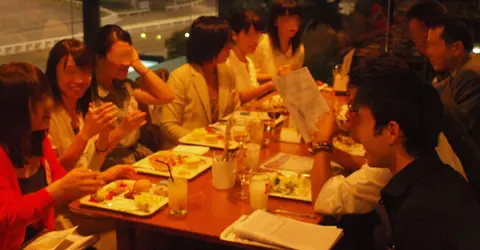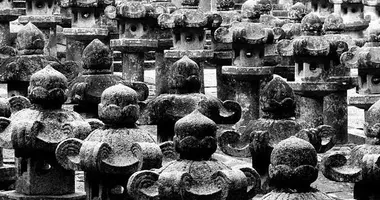Gokon 合コン

The gokon - Japanese group dating
Group dating, Japanese style!
Finding your soulmate isn't easy. Especially so in Japan, where men and women don't generally go out in mixed groups. To expand their social circle, and try to find that special someone, the Japanese have devised a technique that is not widespread in the West: the gokon, a kind of group blind date!
What is a gokon ?
Literally meaning ''mixed meeting'' the word gokon is an abbreviation of the expression godo konpa, a phrase which describes a particular style of ''dating'' very popular in Japan: meeting as a group!
Related : Uchi and soto
Made up of an equal number of men and women, a gokon usually takes the form of a dinner organised by two members of the group (a man and a woman) where the participants enjoy an evening while getting to know each other. They drink, eat, and try to end the evening with the phone number of whoever they hit it off with best!
This practice, very Japanese in terms of traditions and customs, actually dates from the 1970s, when students organized mixed nights on campus to try to meet people of the opposite sex.
It is a tradition that now continues on past college, since the gokon remains for many Japanese the only way to meet new people, even after graduating and having entered the world of work.
- Read:Marriage in Japan
Meet new people in a relaxed atmosphere
Too busy to search for a partner, or not enough opportunities to meet outside of work, many Japanese use these "group dates" to expand their social circle.
In a culture where men and women don't often go out casually together, it's quite difficult to meet someone outside of your circle of friends. Gokon are a great way to meet new people, while avoiding the pressure of a one-on-one "first date".
Indeed, a gokon is a good way to quickly break the ice with the opposite sex!
Usually organised by two participants who already know each other, the dinner is held in a friendly atmosphere. The men are seated on one side, the women on the other, and the organizers of the evening are responsible for the introductions.
Called kanji, the organizers of the gokon are responsible for the success of the evening.
Not only do they choose the place of the meeting, but they must also find the participants, the female kanji inviting the female participants, and the male kanji taking charge of the other men. In general, they will invite co-workers, or acquaintances from an activity or club they attend.

A gokon in action
Great if you fear an awkward ''first date'', a gokon also allows all the participants to get to know each other naturally.
Presenting itself primarily as a group outing, a gokon aims to be natural and good-natured. Everyone is talking to everyone else, the shy can just listen, and connections are made (or not) as the evening progresses. And this is the great thing about group meetings! It's possible to let the magic occur naturally, away from the discomfort that can sometimes occur on a two person date, when there's just no spark and both are counting the minutes until the night is over!
Gokon by the thousands
Today gokon are as popular in Japan as they were in the 1970s. And lately, new kinds of meetings have started appearing, to get off the well trodden route of the organized dinner.
For example there's the shumikon - taken from the word shumi ("leisure" or "hobby"), the expression shumikon refers to a gokon organized around a common interest, such as karaoke or bowling, for example.
Read more: Karaoke
There is also:
- The asakon: the term asakon refers to a gokon organized in the morning ("asa" in Japanese). Generally, they're aimed at early birds who enjoy meeting over a morning coffee.
- The lunchon: These are gokon for people in a hurry, since they usually gather office workers on their lunch break who, busy with overtime in the evening, prefer to quickly get acquainted over lunch before returning to work.
- The machikon: these are gokon organized by cities. They are generally organized by age, and residents must book in advance to participate. Although the primary goal is to help their inhabitants to find love, the machikon can be more of an opportunity to strengthen solidarity in the municipality than to form couples.









